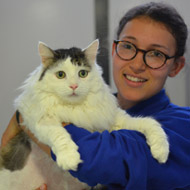
Twelve-kilo moggie weighs three times its recommended weight
Concerned staff at Battersea Dogs & Cats Home are desperately trying to help a morbidly obese cat lose weight in the run-up to Christmas.
The monstrous moggie, named Texas after America's infamously larger than life state, was brought into the rescue centre weighing a whopping 26 pounds. Staff at Battersea were stunned to see the size of the eight-year old domestic long haired cat, which proportionally would weigh the same as a 41-stone middle-aged man.
Battersea's Cattery Team Leader, SuiLi Weight, said: "Many people may be starting to think about losing a few pounds in the countdown to Christmas, but for Texas this really is a very serious health issue he’s battling. At Battersea we take in around 3,000 cats every year, so we see cats of all shapes and sizes, but Texas is by far the biggest cat we’ve ever seen. We have had to specially kit out his pen with a double staircase up to his bed and extra bedding to make sure he is comfortable. Some people might think it’s funny to see a cat this big but it is in fact extremely sad to see an animal which is suffering so badly.”
Texas was brought into Battersea because his owner had passed away. He has now been put onto a weight loss programme to help him lose the pounds, and shares a home with foster carers where he has more room to move around and exercise.
SuiLi added that overfeeding your cat is a form of cruelty. "You may thinking you are showing it love by giving it treats and feeding it human foods, but it's in fact an incredibly cruel thing to do in the long run."
If you would like to rehome Texas, call Battersea on 0843 509 4444 or visit www.battersea.org.uk



 The Veterinary Medicines Directorate (VMD) is inviting applications from veterinary students to attend a one-week extramural studies (EMS) placement in July 2026.
The Veterinary Medicines Directorate (VMD) is inviting applications from veterinary students to attend a one-week extramural studies (EMS) placement in July 2026.